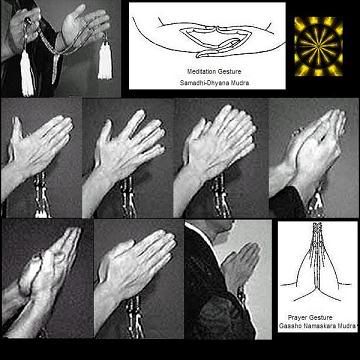First of all, this is not the same as the 祈 ki, as in kito. Also, note that 気 [ki] is sometimes romanized as qi or chi, which is from the Chinese readings of 気. The word is seen in Reiki 霊気, Akido, and Qigong or Chi kung. The original sanskrit term is prana; the Greek is pneuma. The kanji means spirit, mind, air, atmosphere, or mood. According to wiki, "Prana (प्राण, ) is a Sanskrit word meaning 'breath' and refers to a vital, life-sustaining force of living beings and vital energy in natural processes of the universe ..."
At any rate, I first heard the word ki [気] some 40 years ago in connection with karate exercises used to "ki up." I noticed even then that the "ki up" exercises aroused a vague sense of a sort of vital energy, especially in my hands. The next time I experienced Ki 気 was in 1972, when I started chanting Nam' Myoho Renge Kyo.This time it was not vague at all. After 20 minutes of chanting, with my palms pressed together in the gassho prayer gesture, my hands would get very hot. Then a magnetic like energy would build up and sort of push my palms apart. It was like what happens when like poles of a two magnets are pushed together, I had to press my palms together with more effort to maintain the gassho mudra.

This was intensified after I acquired a wooden juzu / rosary; I broke quite as few. Once I stopped pushing my palms, and relaxed, my hands would slowly pull apart. Next, my hands and arms would spontaneously go through a series of mudras, and then rest in my lap, in what I later learned is the dhyani-mudra. I also noticed that this odd magnetic energy appeared to transfer to my juzu, especially when I used a particular wooden one [which I finally lost about 1991]. After I finished chanting, I would set that juzu down on the alter table, and it would move, in kind of a ripple or wave motion. I even tried applying the energy to telekinesis, with no success. I could not bend a spoon.
Needless to say, I was rather reticent about this experience. I did make a couple quiet inquiries with some experienced members and leaders. My queries resulted in quizzical looks, amused eye rolling, some condescending sneers, dismissive attitudes, and so on. One of the Japanese women told me I must have been a snake worshiper in my previous life. So, I decided to keep it to myself. I guess I sort of pushed the experience into the back of my mind and dove into Soka Gakkai activities.
More recently, I have noticed that chanting other mantras, such as the Chenrezig Mantra, Manjushiri Mantra, and so on; seem to generate the same magnetic like energy, though on different frequencies or modulations than Daimoku. I have also found that it is more difficult to "ki up" as I grow older. To the extent that I am able to generate this energy, it has been useful in healing from a fairly serious long term neurological disease. I do not know what prana / ki / qi / chi actually is, but I know there is something here that is worth exploring. I also know that it can potentially be summoned or aroused by focused chanting meditation.



1 comment:
Amazing what the energy around us can do,,,
Post a Comment